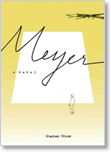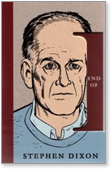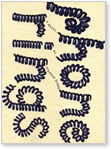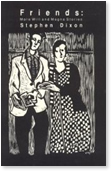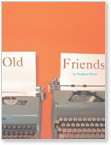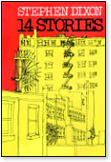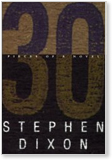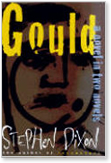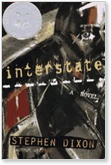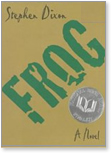No Knocks
posted Apr 1, 2008
I go out into the street. Finally, it’s a nice day. Rains came, went; sun now. I say hello to my landlord. Next-door neighbors. Wave to Mrs. Evans behind her window. Mr. Sisler sitting on his stoop across the street. Rob’s boy walking their dog just before he goes to school. Mary Jane Koplowitz dumping her family’s garbage on her way to work. Children, workers, cyclists, pedestrians, mailman. “Howdy-do. How are you? I feel great. Lovely day. What a relief after so much rain. Hiya. Morning. Hope the good weather holds. See ya. Take care. Hope you have a nice day.” I walk down the block and say more of the same. “Hello. Morning. How’s it going? So long. Have a great day.” Friendly street. Living on it for years. People know who you are, what you do. What do I do? They know I do relatively nothing. Just about nothing. Nothing. They know. In other words, they also know what you don’t do. I don’t work. They know. No home projects or work for other people that keeps me home. They know that too. I walk, talk, read. I get up first. I have breakfast, wash, shave. Shower every day. No shower in the morning, then an evening shower. Then I go downstairs. Not after my evening shower, though I might do that too, but after I do all those morning things. I never bother checking the mailbox anymore, on the way out or when I come back. There’s never any mail. I’m waiting for the day the mailman says “Mr. Rusk, your mailbox is jammed full. I can’t stuff any more mail inside. Please take the mail out so I can have room to put new mail in. At least take some of the mail out so I can have some room to put new mail in.” That’ll be the day. Day I might even look forward to. Do I? No, though once did. But it’ll be a day, all right. What’ll those letters be like? Say it happened. And who’d write? Nobody. I know no one other than from the street and around the immediate neighborhood. No relatives, friends, old acquaintances. And I tell people who move off the block or out of the neighborhood “Just come back and visit if you want, but don’t bother to write. I never bother opening my mailbox, so I’d never get your mail. Only day I’ll open my mailbox is the day the mailman tells me it’s too full to get another piece of mail in, but that’ll be the day. But say that happened. I might only take out a few pieces of mail, or just one big one, to make room in the box, so I still might not get your mail.” And I pay all my bills by cash and personally and on time. So no need for mail. I’ve none. No need for it and no mail. And the mailman’s instructed not to put any junk mail in my mailbox. The instructions are on the building’s vestibule letterbox for the mailman not to put any junk mail into my mailbox. Or they’re on the vestibule mailbox for the mailman not to put any junk mail into my letterbox. One or the other. I’ll go to the library one of these days to look up the difference in the dictionary between those two. If there isn’t one, I’ll find that out too. A difference. Mailbox and letterbox. Both I get my mail in, but which is which? And if the vestibule box that houses all the tenants’ smaller boxes for mail is called a letterbox and those tenant boxes are called mailboxes, or vice versa, then what’s the box on the street called that people put their mail in? Not only people. Yes, only people. I was going to say “Not only people but children too.” But children are people too. Children are people, period. I don’t know what could have been on my mind when I started to say “Not only people but children too.” Caught myself this time. Other times also, but my mind’s particularly sharp today. Not particularly. Not even sharp. Mind’s just functioning a bit better than yesterday. Not even that. I can’t really tell if it’s functioning any better today than yesterday. Mind’s functioning better now than when I woke up today. That’s for sure, so that I can at least say. But now I’m at the corner.
I look around. No one I know here. People, yes, but no one I know to talk to when I feel like talking to someone. I look all four ways. Up the block I just came down. Down the next block of this street that I don’t think I’m going to continue on. Both ways along this avenue I’m now on. Though who’s to say where the avenue begins and sidestreet ends when one’s standing on the corner where the avenue and sidestreet meet? I’m sure plenty of people can say. I can’t. Not right now at least. But all four principal directions, in other words. East, west, etcetera. No one I know. No one who knows me. There’s a difference there. Lots of people— Not lots. Several. A few, I’ll say, claim to know me when I don’t know them. Not claim. But they say they know me. They’ll come over to me or just stop me and say “Hello” or “Good morning (etcetera), Mr. Rusk.” In other words, that etcetera: all depending on the time of day in the time zone we’re in. If, for example, they say “Good morning, Mr. Rusk,” when it’s obviously evening, then I figure they’re joking or confused or even crazy or they made a simple word-reverse mistake, and I react according to how I feel at that moment about why they greeted me this way by my last name. If they use Mrs. or Miss before my last name, then no matter how accurate they are with the time of day, I ignore them or question them about the use of that conventional title of respect. But say they do say “Good morning, Mr. Rusk,” when it’s morning or close enough to it where I don’t think the greeting is strange. If I look at them as if I don’t know them—and usually when I look at them this way, I don’t know them—they’ll say “I know you but you don’t know me.” Sometimes they’ll greet me and immediately say that about my not knowing them, even though I do know them and they know I do. And sometimes when I know them and they know I do, though they’ll say I don’t, I’ll look at them as if I don’t. Why will I give them that look when I do know them and why will they say I don’t know them when they know I do? Couple of reasons, at least, that I can think of. But today none of that happens. So no one to talk to now unless I stop someone I don’t know and who I know doesn’t know me and start to talk to him, something I don’t like to do.
If I walk uptown on this avenue, which is north, the chances of stopping someone I know in proportion to the number of people on the street will be much less than if I walk downtown, which seems to get more crowded the further south you walk. The chances of stopping someone I know in proportion to the number of people on the street would be greatest if I walked back to my block and kept walking up and down it and especially on my side of it, but I don’t like going over the same route so soon after I came off it. I could cross the avenue and continue west along this same numbered street. But partly out of personal reasons, which I won’t go into, and because the chances of stopping someone I know in proportion to the number of people on the street would be no better walking west than walking uptown, west seems the least likely direction to go except if I didn’t want to stop or be stopped by someone. I could, of course, create many other routes other than just walking straight in one of the four principal directions. I could go north four blocks, then west till I hit the river; or south three blocks and east one and then south again till I get to the heart of the city; or south two blocks and east three and across the park and continue east till I hit the river that runs along the other side of the city, and so on. But I think the best chance, without going back to my side of my block and walking up and down it, of stopping someone I know or being stopped by someone I know or don’t know but who says he knows me, is to walk downtown on the avenue I’m on.
So I walk south. I see no one I know on this avenue and am not stopped by anyone. I keep walking. Chances get less with each step that I’ll meet someone I know or don’t know but who says he knows me. I walk five blocks, six. Chances get even less, and after four more blocks, almost nonexistent. Then I’m so far away from my neighborhood—sixteen blocks—that I feel if I want to talk to someone now, and I think I do, the only way would be if I stopped someone I don’t know, and chances are almost nonexistent here that he’d know me, and start up a conversation with him despite my dislike or reluctance or apprehension, or whatever it is, in doing so.
First person I see on the street, and now I’m twenty blocks from where I live, who I think I’d like to stop and talk to is a man. Not because he is a man. Though maybe because I’m a man I prefer to stop a man stranger to a woman, since I think a man would be less alarmed at being stopped by someone he doesn’t know and feel more willing to talk to a stranger than a woman would, though I could be wrong. Are women less likely to be bothered or frightened by women strangers who stop to talk to them than by men? I’d think so. And what about men in regard to women strangers who stop them because they want to start up a conversation, or even for other reasons, like asking change for a dollar, let’s say, or asking for a handout, or a donation of some kind? I’m not sure. But this man. I might now know why I prefer stopping a man I don’t know, to a woman, but I’m less sure why I think I’d like to stop and talk to this man out of hundreds I’ve passed. It could be his clothes. One reason. He’s dressed in a sports jacket and slacks, boots, big wide-brimmed western hat, and is carrying a closed umbrella and flat package, and has an overcoat over his arm. But closer I get to him from behind, more I think the flat package is a thin book and the jacket and pants are a suit made of a heavy fabric and the overcoat is a parka and the umbrella a black cane. When I get right up behind him and then am walking alongside him on his left, keeping in pace with him now, I see that the flat package is a book, on cytohistology, its cover says, another word, if I remember it and remember to look up, I should look up at the library one of these days. The other was what? I forget, though it came to me today and could come back. The cane’s the closed umbrella I originally thought it was, but beige rather than black. Boots are western and well polished and recently heeled and have intricate stitching on them that looks like a lot of lassos. Parka is several djellabas that I suppose he’s taking to a store to have cleaned, though that’s a wild guess. His hat is still a Stetson-type, though leather instead of felt. Shirt’s almost the same color as the suit and seems to be made of chamois cloth, while the suit’s suede. Brown suede. Light brown. Darker brown leather buttons in a hatched pattern. Flap pockets. Same kind of buttons on the pockets. Or at least the left flap pocket has that button; the right one could be different or have come off, for all I know. A tie. Red. Stickpin. Gold. Cuff links. Just initials or one word: DAD. Or at least the left cuff link has those initials or that word; the right one could say MOM, for all I know, and also gold. “Hello,” I say.
He stops. “Do I know you?”
“No. Do I know you?”
“Not as far as I know.”
“That’s what I should have said. Not ‘No.’ But ‘Not as far as I know.’”
“Then we definitely, or almost definitely, which could be undefinitely but not nondefinitely, don’t know each other as far as we know, could that be right?”
“As far as I know it can’t be ‘We definitely don’t know each other,’ but on the other one you’re right. Now as far as knowing each other, my memory does fail me sometimes. So we could still know each other. If we do, I’ve forgotten, and I’ll have to leave it up to you to remember.”
“My memory does fall short of me also,” he says. “No, that’s not the word. The words. My memory does fail me also, as far as I’m concerned. And that’s not the expression. My memory occasionally fails me also, as it does everyone, but I’m almost sure I don’t know you. Years ago I might have. But there comes a time when I have to say about someone I knew long ago but since then haven’t spoken or written to or heard from in any way, or seen, and if I did see him, didn’t recognize him, that I don’t know him now.”
“So we could have known each other once, you’re saying.”
“Possibly,” he says. “But our faces could have changed so much since then that we don’t recognize each other now. And our eyesight, in addition to our faces or apart from them, and to a lesser degree as a recognizing factor, our voices, mannerisms, appearances and clothes. Anyway, to boil it down to the minimum: if I once knew you, I don’t recognize you in any way now. How about you?”
“Same here all around. So how are you?”
“Do you mean, since I last saw you, if I ever did see you, or last heard from you, if I ever have?”
“Yes.”
“I’m fine, since we last spoke, wrote or saw each other, if we ever did. And if we didn’t, I can still say I don’t think I’ve had a bad day that I can remember since I was born. That’s not to say I haven’t. My memory again. What it does say is that as far back and as much as I can remember, I haven’t. Had a bad day, I’m saying.”
“I can’t say that.”
“Well, it’s over now, whatever it was, isn’t that right?”
“I can’t say that either.”
“Broken love affair? Family tragedy? Professional or affinal crisis? Illness? Malaise? Something you read in the newspaper? Got in the mailbox? Witnessed from your window? Saw in the street? Personal experience or experiences? Is one of those it, or are some to all of those them, and which can’t be broached, right?”
“Personal experience, yes.”
“A woman?”
“Can’t be broached, yes.”
“Yes, a woman.”
“Can’t be broached.”
“The woman? The subject?”
“Can’t be broached, can’t be broached.”
“Too bad, then. That it happened. And that she or it can’t be broached.” Sticks out his hand. “Lionel Stelps.”
“Victor Rusk.”
Shaking of hands. Nicing of days. Changing of weathers. Preferences of sun to rain, city to suburbs, streets to parks, busier the better. What do you dos? Where you off to’s? Going my ways? Okays. Walk, Talk. Seems he likes almost nothing better in life than to walk the streets too. To talk to people he knows or doesn’t know but who know him, or to people he doesn’t know and who don’t know him but who like almost nothing better in life than to walk the streets and be stopped by people they know or don’t know, and for many of the reasons that he and I do. Because we like people. Talking and listening to people. Because we like to be outdoors and preferably on the busy and hectic streets of the city with many kinds of people of both sexes and all sorts of age groups and occupations and pursuits. He’s very much like me, in other words. Maybe that’s why I wanted to stop him, when I ordinarily don’t want to stop anyone I don’t know and who shows no signs of knowing me. Not just his clothes. Not that I could have known much what he was like or what he almost liked doing best in life just by his clothes. Not that I really could see what his clothes were like, and especially the front part, from so far away in back when I first spotted him and thought I might want to stop him. Not that I even like to stop people who are like me in any way and who like almost nothing better in life than walking the streets to stop and talk to people or be stopped by people they know or don’t know but who know them or show some sign they do. And as far as I know he isn’t like me except for what he almost likes to do best in life and that he likes what helps contribute to it: mild weather, good health, sufficient sleep, crowded city streets, etcetera. His voice, face, hair, build, height, weight, age and just about everything else about him, and especially his clothes, aren’t like me or mine at all. He’s well-kempt, -shoed, -spoken, -bred, more mildly mannered than I, it seems, and he wears a hat. I don’t own a single headpiece. Not even a winter cap, or hat with a brim of any kind to keep the sun off my face. Must be lots of people who do what we do, we say. Streets, walk, talk, people, stop, like to be stopped, and so on. Now the sun goes. I probably got a bit of a burn on my face today, which he didn’t because of his hat. Continue to talk. He’s lived a few more years in his apartment than I have in mine. Streets get less crowded, and not because we’ve passed through the heart of the city or it’s that time of day. Bad sign, we say. Clouds come. We continue to walk. Three more blocks, four. Sky darkens. Talk about what we don’t like to do most. Stay inside on nice days like this one was, for one thing. Not talking to anyone for hours, another thing. Day after day of unrelenting rain is probably the worst thing. Wind. Store awnings quaking. People hurrying. Signboards swinging. People running. They sense something. Finally, we do too. Or I just sense it, because it’s possible he already did and wasn’t saying. Maybe because he wanted to continue talking. “Pity,” he says. Pats my shoulder.
“Pity is right,” and I pat his shoulder.
“Though nice chat we had.”
“Yes, while it lasted. No, that’s not what I wanted to say or how I wanted to say it. One of those, not both. But I think you know what I mean without my going into it or repeating what I wanted to say the right way.”
He doesn’t say yes or no or nod or shake his head. He smiles, a weaker smile than the ones before, and sticks out his hand. I stick out mine and we shake. It starts to sprinkle.
“See you sometime,” he says. “But I better run. Don’t want to ruin my clothes.”
“I guess I don’t mind getting—“ I begin to say, but he walks away. Put up his umbrella and is heading further downtown. That where he lives? Maybe he was shopping in midtown. But he had no package. The djellabas. But they weren’t bagged or wrapped. Maybe he came to midtown to get them from a friend, or even the umbrella or book or hat or he bought something that can’t be seen in a pocket or around his neck or wrist. Or even his ankle. Men sometimes wear ankle bracelets, though that’s the least likely prospect I mentioned. Or maybe he strolled all the way to around where I live and possibly beyond, and just to stroll—for exercise, let’s say—and I caught him walking back to his home downtown. But that doesn’t explain the djellabas. The book he could be carrying for any number of reasons. For instance, just to read in a stopping-off place like a café. What was the subject matter of the book again that I was going to look up? Forget. Such a long, complicated and unfamiliar word, and I doubt I’ll ever be able to remember it. Maybe he hurried off with that rain excuse because he knows something more about this area than I. I rarely get this far from my block. The last time was when? Can’t remember. Well, lots of questions, and nothing like a little mystery in one’s life. What’s the mystery in mine? That personal experience I brought up and didn’t explain? Bet he’s wondering about it now. Woman, hmm, I can see him thinking. Actually, I can still see him walking downtown, the umbrella still protecting him. He’s a block away but not many people between us. Then he disappears. Maybe he ducked in someplace to get out of the rain. Doesn’t even want a few drops on his clothes, if that excuse was the truth. What I was going to tell him before he left was “I guess I don’t mind getting caught in the rain as much as you.” He would have asked why. I would have said “My clothes are quite old and used. First old, then used. I mean by that: made old by someone else, or who knows how many people, because who knows how many thrift shops they were in, then further used by me. In plainer language: I bought all the clothes I have on in a thrift shop. Several thrift shops, but they all came from one. Meaning: several different thrift shops, but they’re all thrift-shop clothes. In even plainer language: they’re worn, shabby, very cheap clothes that were the only ones I could afford in several very cheap thrift shops. What could be called work clothes if I worked. Worked at a laborer’s job where one didn’t need good clothes. In the plainest language possible: I don’t mind ruining them; they’re already ruined.”
I look in all four directions. I seem to be one of the few pedestrians on the streets, and those that are on them are protected by rainwear or umbrellas or both. But why get wet? It’s pouring now, so I mean why get wetter? I duck under a store awning. But why duck? Ducks take to rain, don’t they? That might have elicited a laugh from that man. A good joke, I think, and I laugh out loud. Oops. Someone’s under the awning with me. A woman, also with no umbrella or rainwear.
“Howdy-do,” I say to her. “Nice day, eh?” She gives me the fisheye, looks away. One of those. Meaning: she is.
“Just a joke,” I say. “Minor. Harmless. Didn’t mean anything by it. Just the good mood I’m in. But some rain. Cats and dogs, yes? Bats and hogs, no.” Fisheye, looks away. Still one of those. No letup. She nor the rain. Me too, I guess. Strangers. But maybe I’ll get to her yet. In a good way, I’m saying. “Okay, I understand, madame. Takes all kinds, and I love that it does. But must say good-day. I must, not you. For ducks take to rain as they do to water, don’t they? In fact, rain is water. Rainwater, of course.” Fisheye, mutters, clutches her handbag closer to her, moves two steps away from me but still under the awning. I laugh to myself, but inside this time. Sort of to balance the last time I laughed out loud, which was to an inside remark.
I salute her goodbye and step into the rain. Really pouring now. Buckets. I start running north. Every so often I duck under a store awning or building overhang and try to make talk with someone there, and the awnings and overhangs I choose I choose because someone’s there, but have no luck. Could be the clothes and that I’m so wet. And more I run, wetter I get. And there’s nobody I know under these overhangs or who seems to know me. If they do, they’re not saying, something I can also understand. A man so drenched and who keeps running in the rain without any protection can seem crazed. I run a few more blocks, keep ducking under overhangs, more because I’m tired than to talk to anyone, so some of the overhangs I duck under don’t even have anyone there. Run a lot more blocks, but I’m really just jogging now, and walk fast and then at a normal pace the last five blocks till I reach my sidestreet. I run down the block—there’s nobody out or at the window to wave to—and go two steps at a time up my building’s stoop into the vestibule, where the landlady’s mopping the floor under my mailbox or letterbox I don’t open but do peek through and see nothing inside.
“Some day out,” I say, but she’s in no mood to talk. And when she’s mopping while it rains she usually gets less in the mood with each succeeding dripping tenant. “Have a good day, though,” I say, and run up the three flights of stairs to my apartment to do some undressing, showering, maybe soaking in a tub, drying, dressing, wet-clothes hanging, eating, resting and sleep. All that and more till later today or early tonight or tomorrow or tomorrow night or sometime this week, depending if the rain stops and if it’s not too late in the day, I can go out again.
© 2008 Stephen Dixon





